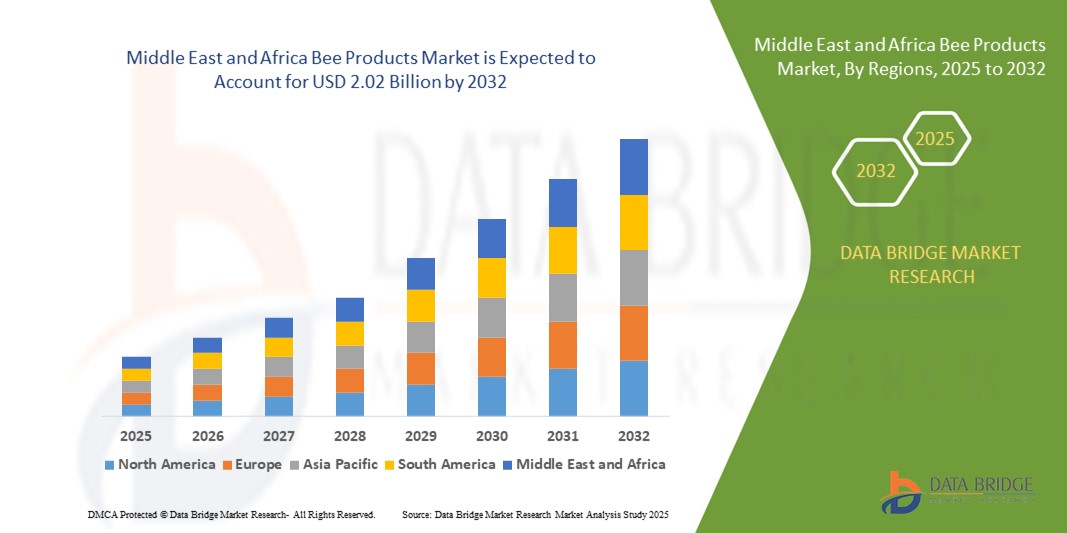Middle East And Africa Bee Products Market
市场规模(十亿美元)
CAGR :
% 
 USD
1.11 Billion
USD
2.02 Billion
2024
2032
USD
1.11 Billion
USD
2.02 Billion
2024
2032
| 2025 –2032 | |
| USD 1.11 Billion | |
| USD 2.02 Billion | |
|
|
|
|
中東和非洲蜂產品市場細分,按類型(蜂蜜、蜂蠟、蜂膠、蜂王漿、蜂毒等)、性質(有機和常規)、分銷管道(間接和直接)——行業趨勢及 2032 年預測
中東和非洲蜂產品市場規模
- 2024 年中東和非洲蜂產品市場規模為11.1 億美元 ,預計 到 2032 年將達到 20.2 億美元,預測期內 複合年增長率為 7.79%。
- 市場成長主要得益於對天然保健品的需求不斷增長、人們對蜜蜂衍生產品藥用價值的認識不斷提高,以及蜂蜜、蜂膠和蜂王漿在功能性食品、化妝品和藥品中的應用不斷擴大
- 蜂療日益普及,以及消費者對源自天然的增強免疫力和抗衰老產品的興趣日益濃厚,也推動了成長
中東和非洲蜂產品市場分析
- 由於消費者越來越青睞清潔標籤和天然成分,中東和非洲蜂產品市場正在穩步成長。蜂蜜、蜂花粉、蜂王乳和蜂蠟等產品因其抗氧化、抗菌和抗發炎特性而日益受到青睞。
- 有機農業的興起、健康產業的成長以及蜂產品被納入運動營養和護膚配方,進一步推動了市場擴張。隨著永續發展和環保意識的增強,對符合道德規範且可追溯的蜂產品的需求預計將上升。
- 2024年,沙烏地阿拉伯蜂產品市場在中東和非洲地區佔據主導地位,這得益於其根深蒂固的文化和宗教背景,蜂蜜在日常飲食和傳統醫藥中被廣泛使用。沙烏地阿拉伯政府推出的推廣本土養蜂業的舉措,包括培訓計畫和補貼,提高了蜂蜜產量,並減少了對進口的依賴。
- 由於人們健康意識的增強、對天然膳食補充劑的需求不斷增長,以及政府積極推行養蜂計劃,將養蜂作為農村發展和創造就業的一部分,南非預計將成為中東和非洲蜂產品市場中複合年增長率最高的國家。透過擴大零售通路和線上平台,產品可近性得到提升,進一步加速了市場成長。
- 2024年,蜂蜜佔據了最大的市場份額,這得益於其在食品飲料、天然藥物和護膚品中的廣泛應用。蜂蜜作為天然甜味劑和免疫增強劑的定位,大大促進了其在已開發國家和發展中國家的消費成長。蜂蜜的多功能特性使其成為家庭廚房、保健產品和治療應用的必需品,並保持了其市場主導地位。
報告範圍和中東和非洲蜂產品市場細分
|
屬性 |
中東和非洲蜂產品關鍵市場洞察 |
|
涵蓋的領域 |
|
|
覆蓋國家 |
中東和非洲
|
|
主要市場參與者 |
• Balqees Honey(阿聯酋) • 薩凡納蜜(南非) • 自然花蜜(肯亞) • 齊齊拉(衣索比亞) • Bee Natural Uganda(烏幹達) • Asali Organic(肯亞) |
|
市場機會 |
• 擴大蜂產品在運動營養和功能性飲料中的應用 |
|
加值資料資訊集 |
除了對市場價值、成長率、細分、地理覆蓋範圍和主要參與者等市場情景的洞察之外,Data Bridge Market Research 策劃的市場報告還包括深入的專家分析、定價分析、品牌份額分析、消費者調查、人口統計分析、供應鏈分析、價值鏈分析、原材料/消耗品概述、供應商選擇標準、PESTLE 分析、波特分析和監管框架。 |
中東和非洲蜂產品市場趨勢
功能性和藥用蜂產品需求增加
- 消費者對天然和功能性健康解決方案的日益青睞正在重塑蜂產品市場,蜂蜜、蜂王漿、蜂膠和蜂花粉因其抗氧化、抗菌和增強免疫力的特性而備受青睞。這些產品越來越多地用於膳食補充劑和預防性保健的天然療法。
- 在已開發市場和新興市場,蜜蜂衍生成分正被納入營養保健品、個人護理產品和治療配方中。健康運動的興起以及人們對清潔標籤、無化學成分、提供全面益處的產品的日益關注,進一步推動了這項需求。
- 使用蜂產品進行治療的蜂療療法的興起也推動了製藥和替代醫學領域的創新。消費者開始轉向使用蜂產品來治療發炎、感染和皮膚健康等疾病,從而促進了產品應用的多樣化。
- 2022年,埃及國家研究中心與當地養蜂合作社合作,開發蜂源治療產品,如蜂膠軟膏和蜂王漿膠囊,用於皮膚病和免疫健康。這項計畫透過科學驗證和本地生產推廣傳統蜂產品,增強了這些產品在中東和非洲消費者中的可及性和信任度,從而支持了醫療保健產業和農村經濟發展。
- 雖然市場正在擴張,但成功取決於持續的產品標準化、可追溯性和品質保證。企業必須注重道德採購和透明標籤,以維護消費者信任,並滿足消費者對優質功能性蜂產品日益增長的需求。
中東和非洲蜂產品市場動態
司機
消費者對天然保健和個人護理產品的偏好日益增長
• 向無化學成分、天然來源解決方案的轉變顯著推動了蜂產品在食品、化妝品和製藥領域的應用。消費者越來越尋求安全、有效、永續的產品,這些產品符合蜂蜜、蜂蠟和蜂王漿等蜂產品成分的天然來源和治療價值。
• 在美容和個人護理行業,蜂蠟和蜂蜜因其保濕、抗炎和抗菌功效,被廣泛應用於有機護膚品、唇部護理和護髮產品中。這種趨勢也體現在含有蜂膠和花粉以增強免疫力和活力的食品補充劑中。
• 對傳統和天然藥物體系的監管支持正在進一步擴大市場覆蓋範圍。越來越多的蜂產品成分被納入核准產品清單和功能性食品類別,從而促進了更廣泛的認可和分銷。
• 例如,2023年,阿聯酋氣候變遷與環境部與當地農業研究中心合作,推動蜂膠和蜂王漿等蜜蜂衍生產品的永續生產。該倡議旨在促進國內養蜂業發展,支持傳統醫藥實踐,並鼓勵蜂產品融入中東和非洲地區的健康和營養市場,從而促進地區自力更生和經濟多元化。
• 雖然對天然食品的偏好正在推動市場向前發展,但確保真實性和控制摻假風險對於長期信任和永續成長至關重要
克制/挑戰
蜂群崩潰與環境不穩定所帶來的威脅
• 蜂產品市場面臨的主要限制因素之一是蜂群崩潰症候群(CCD)和環境惡化的威脅日益加劇。由於農藥使用、棲息地喪失和氣候變化,蜜蜂數量下降嚴重影響了原材料的供應以及蜜蜂供應鏈的可持續性。
• 氣候條件的波動會影響花期和花蜜供應,進而降低蜂蜜產量並擾亂蜂場運作。這種不可預測性限制了產品品質和產量的一致性,對依賴穩定供應進行大規模生產的製造商構成挑戰。
• 養蜂人,尤其是在發展中地區的養蜂人,也面臨疾病管理、農藥暴露以及現代養蜂實踐機會有限等挑戰。這些問題影響了生產能力,並限制了其滿足日益增長的工業和消費者需求的能力。
• 例如,2023年,中東和非洲的幾個養蜂協會報告稱,由於反常的強降雨和氣候變化,蜂蜜產量大幅下降。這一中斷影響了有機和優質蜂蜜的供應,進而影響了區域供應鏈和出口承諾。這種短缺促使人們對氣候適應型養蜂實踐和技術幹預措施的興趣日益濃厚,以穩定未來的生產並保障市場。
• 為了降低這些風險,利害關係人必須投資於永續的養蜂實踐、抗病蜂品種的研究以及改善生態系統保護,以保障長期供應和市場穩定
中東和非洲蜂產品市場範圍
市場根據類型、性質和分銷管道進行細分。
- 按類型
中東和非洲蜂產品市場按類型細分為蜂蜜、蜂蠟、蜂膠、蜂王乳、蜂毒等。 2024年,蜂蜜佔據了最大的市場收入份額,這得益於其在食品飲料、天然藥物和護膚品中的廣泛應用。蜂蜜作為天然甜味劑和免疫增強劑的定位,大大促進了其在已開發國家和發展中國家的消費成長。蜂蜜的多功能特性使其成為家庭廚房、保健產品和治療應用的必需品,並保持了其市場主導地位。
預計蜂膠市場將在2025年至2032年間迎來最快成長,這得益於其在營養保健品和個人護理產品中的應用日益增加。其抗發炎、抗病毒和抗菌功效正推動注重健康的消費者和健康品牌的強勁需求。功能性產品(尤其是增強免疫力的配方和護膚品)的開發熱潮預計將加速蜂膠在全球市場的普及。
- 天生
中東和非洲蜂產品市場依其自然屬性可分為有機蜂產品和傳統蜂產品。傳統蜂產品在2024年佔據了最大的市場收入份額,這得益於其廣泛供應且價格低於經過認證的有機蜂產品。傳統蜂產品由於供應鏈穩定且成本效益高,主要由大眾市場食品、藥品和化妝品製造商採購。
預計有機產品領域將在2025年至2032年期間實現最快的成長,這得益於消費者對無化學產品和永續採購意識的不斷增強。在註重健康和環保的市場中,對經過認證的有機蜂蜜、蜂蠟和蜂王漿的需求正在增長。隨著買家越來越追求可追溯且符合道德標準的原料,有機蜂產品在高端零售和直銷通路中正獲得顯著成長。
- 按分銷管道
根據分銷管道,中東和非洲蜂產品市場分為直接通路和間接通路。由於超市、藥局、保健食品商店和電商平台的廣泛覆蓋,間接通路在2024年佔據了市場主導地位。這些管道確保了廣泛的消費者管道,並有助於提高銷量,尤其是包裝蜂蜜、蜂膠噴霧劑和蜂產品補充劑的銷售量。
預計直銷領域將在2025年至2032年期間實現最快的成長,這主要得益於農場到消費者模式和手工蜂產品品牌的日益普及。養蜂人和專業生產商越來越多地利用線上平台、農夫市集和訂閱模式進行直銷。這提高了產品透明度、提升了定價,並增強了客戶參與度,從而推動了該領域的成長。
中東和非洲蜂產品市場區域分析
- 2024年,沙烏地阿拉伯蜂產品市場在中東和非洲地區佔據主導地位,這得益於其根深蒂固的文化和宗教背景,蜂蜜在日常飲食和傳統醫藥中被廣泛使用。沙烏地阿拉伯政府推出的推廣本土養蜂業的舉措,包括培訓計畫和補貼,提高了蜂蜜產量,並減少了對進口的依賴。
- 為了滿足日益增長的需求,國內品牌越來越重視產品品質、可追溯性和包裝創新。此外,旅遊業和送禮文化的興起也持續推動高端蜂蜜的銷售。
- 該國強大的零售基礎設施和對有機認證的支持正在鞏固沙烏地阿拉伯在區域蜂產品市場的領導地位
南非蜂產品市場洞察
預計2025年至2032年期間,南非蜂產品市場將迎來最快的成長速度。這一增長主要源於消費者對天然保健品日益增長的偏好,以及對蜂花粉、蜂膠和蜂王漿等蜂產品營養價值的認識不斷提高。南非不斷擴大的零售分銷網絡以及當地養蜂人提供優質有機產品,進一步刺激了市場需求。此外,政府將養蜂業作為農村發展和永續農業計畫的一部分,大力支持養蜂業,這也促進了該產業的成長。隨著注重健康的消費者群體不斷壯大,以及城鄉地區蜂產品取得管道的改善,南非已成為區域市場的主要成長引擎。
中東和非洲蜂產品市場份額
中東和非洲蜂產品產業主要由知名公司主導,其中包括:
• Balqees 蜂蜜(阿聯酋)
• Al Malaky Royal(阿聯酋)
• 也門西德爾蜂蜜(葉門)
• Wadi Alnahil(沙烏地阿拉伯)
• 阿布奧夫(埃及)
• 薩凡納蜜(南非)
• 自然花蜜(肯亞)
• 齊齊拉(衣索比亞)
• Bee Natural Uganda(烏幹達)
• Asali Organic(肯亞)
中東和非洲蜂產品市場最新發展
- 2023年8月,Badshah Masala與Ennoble社會創新基金會合作,開展了一項基礎設施建設項目,翻新了位於古吉拉特邦翁伯岡的GPS Nargol Mukhya小學和Bhata Fadiyu Aanganwadi學校。該計畫旨在透過改善教室、衛生設施和學習空間,提高250多名學生的教育和衛生水平。該計畫體現了公司對社會責任和長期社區發展的承諾,對該地區的教育部門產生了積極影響。
- 2023年12月,達伯印度有限公司啟動了「科學在行動」活動,這是一項基於知識的推廣計劃,旨在提升阿育吠陀的可信度。該活動透過一系列數位影片、印刷品和專家主導的研討會,力求將傳統智慧與現代研究結合。這項活動旨在教育消費者,建立人們對阿育吠陀產品的科學信任,並擴大達伯在註重健康、注重證據的受眾群體中的影響力。
SKU-
Get online access to the report on the World's First Market Intelligence Cloud
- Interactive Data Analysis Dashboard
- Company Analysis Dashboard for high growth potential opportunities
- Research Analyst Access for customization & queries
- Competitor Analysis with Interactive dashboard
- Latest News, Updates & Trend analysis
- Harness the Power of Benchmark Analysis for Comprehensive Competitor Tracking
研究方法
数据收集和基准年分析是使用具有大样本量的数据收集模块完成的。该阶段包括通过各种来源和策略获取市场信息或相关数据。它包括提前检查和规划从过去获得的所有数据。它同样包括检查不同信息源中出现的信息不一致。使用市场统计和连贯模型分析和估计市场数据。此外,市场份额分析和关键趋势分析是市场报告中的主要成功因素。要了解更多信息,请请求分析师致电或下拉您的询问。
DBMR 研究团队使用的关键研究方法是数据三角测量,其中包括数据挖掘、数据变量对市场影响的分析和主要(行业专家)验证。数据模型包括供应商定位网格、市场时间线分析、市场概览和指南、公司定位网格、专利分析、定价分析、公司市场份额分析、测量标准、全球与区域和供应商份额分析。要了解有关研究方法的更多信息,请向我们的行业专家咨询。
可定制
Data Bridge Market Research 是高级形成性研究领域的领导者。我们为向现有和新客户提供符合其目标的数据和分析而感到自豪。报告可定制,包括目标品牌的价格趋势分析、了解其他国家的市场(索取国家列表)、临床试验结果数据、文献综述、翻新市场和产品基础分析。目标竞争对手的市场分析可以从基于技术的分析到市场组合策略进行分析。我们可以按照您所需的格式和数据样式添加您需要的任意数量的竞争对手数据。我们的分析师团队还可以为您提供原始 Excel 文件数据透视表(事实手册)中的数据,或者可以帮助您根据报告中的数据集创建演示文稿。















